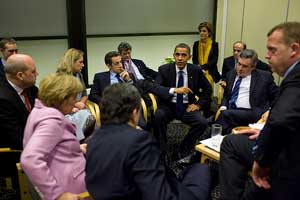In Copenhagen a year ago, inking an accord came down to word choice, essentially. The US wanted China to commit to an international program by which countries would monitor one another’s progress on emission reduction commitments. In the end, the countries agreed on a three-word phrase for this transparency plan: “international consultation and analysis.”
But now in Cancun, what exactly that phrase means is again the subject of much contention. The United States negotiators have said that they want a package here that defines those terms, which they say is crucial to ensuring that the pledges to cut emissions made in Copenhagen are actually met —and that they don’t want to move other pieces of a climate package unless there’s agreement on the transparency front.
This is creating some tension early in the Cancun talks, as a number of countries would like to see progress on other major components of an accord here—things like setting up a technology transfer program, creating a global climate fund to finance adaptation and mitigation in developing countries, and establishing a deforestation initiative. All of those are components of a climate deal that observers and delegates agree can and should be advanced substantially in the Cancun talks. Other nations don’t want to see those portions held up by ongoing disputes over the transparency issue.
US negotiator Jonathan Pershing emphasized in remarks to reporters on Tuesday that the US position believes Cancun should produce a “balanced package.” “There is no reason we cannot get full, robust, operational decisions in all these area,” he said.
But he affirmed the US’s desire to move everything at once: “The package is not disentangled, the package is collective. We will not pull out pieces separately and say the other pieces can wait.”
This echoes comments that US climate envoy Todd Stern made to foreign press in Washington ahead of the summit. “I actually think we’re either going to see progress across the range of issues or we’re not going to see much progress,” Stern said. The US argues that all the components of the package need to move forward together, or else nothing is going to move. The transparency issue is key to ensuring that mitigation targets are actually met, the US negotiators argue.
“We’re not going to race forward on three issues and take a first step on other important ones,” he continued. “We’re going to have to sort of get them all moving kind of at a similar pace.”
Observers—particularly those working with developing countries—are nervous about this kind of all-or-nothing approach. They’re worried that this will create a chicken-or-the-egg scenario, in which developing nations refuse to consent on transparency measures until the US signals it will move forward on a fund that will help developing countries cut emissions and adapt to climate change, and the US in turn would hold up work on the fund because of its concerns. Sol Oyuela, senior adviser on climate change and poverty at Christian Aid, an international religious group focusing on development issues, acknowledged that developing countries need to do better on transparency, but expressed concerns about the US position. “I think everyone acknowledges it’s a very dangerous tactic and we should avoid going there,” said Oyuela.
At least some of the tough talk can be chalked up to the typical posturing in the first days of negotiations, as countries lay out their positions. And the US has actually dialed back its criticism of China in the past weeks, after Stern accused the country of failing to meet its Copenhagen commitments in a speech in October. There’s also been some notable progress, as India recently laid out a proposal for transparency, one that outlines a “facilitative process for transparency and accountability” but does not attach penalties if countries fail to meet goals. Their proposal would also only include the biggest emitters. The European Union has backed the language. India’s delegation has said it expects China to support the proposal, though it’s not yet clear that they will. It’s also not clear if the US will back India’s proposal. Whether all parties can agree to details on this issue in the next two weeks will be an essential element of the negotiations.
“What we’ve heard the past couple days is better than what we heard in the previous three months, but it has to stay that way,” said Lou Leonard, managing director of the climate change program at the World Wildlife Fund. “This isn’t the time for rhetoric, it’s the time for negotiation.”
Christiana Figuera, executive secretary of the United Nations Framework Convention on Climate Change, expressed optimism that countries could move forward with all portions of a deal. “Governments can deliver a balanced package if they engage in the flexibility of compromise and listen to each others’ needs,” she said. “Nobody can afford an immovable position.”
But she also acknowledged that there is much to be hammered out over the next ten days. “Clearly we are here for two weeks because it’s going to take two weeks.”










